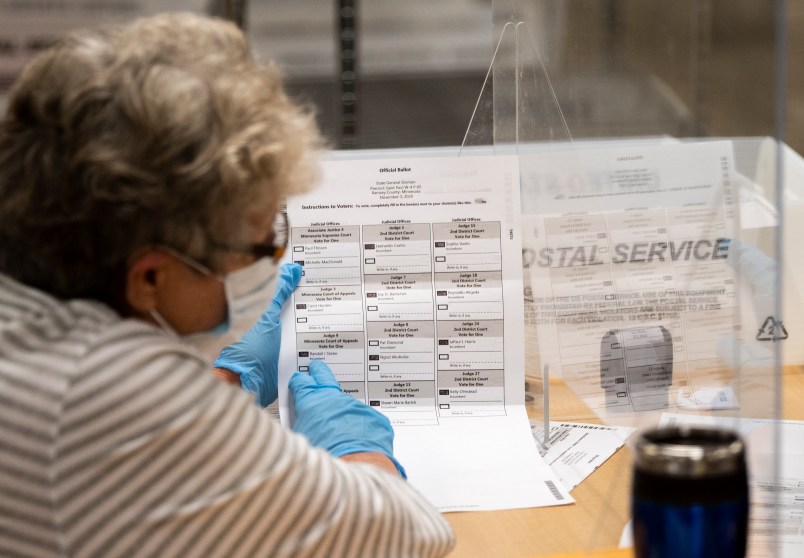The next phase in the Minnesota fight over whether to count properly-postmarked, late arriving mail ballots could focus on whether the Republicans that have sued to reverse the extended deadline should be held to an agreement the Trump campaign made not to challenge it.
The individual voters and organizations who have intervened in the Republican federal lawsuit so that they can defend the extended deadline asked the court on Tuesday to put those proceedings on hold while that question is settled in state court. (The intervenors are being represented by a prominent Democratic election law attorney.)
The move could delay bringing certainty to the deadline battle in the short run. But it could help secure the votes to preserve late-arriving ballots from key Republican-appointees on the U.S. Supreme Court, if the deadline dispute ultimately makes it there.
Minnesota is a state that has polled narrowly but favorably for Vice President Joe Biden after President Trump lost it in 2016. The votes of thousands of Minnesota absentee voters, however, could be at risk after a shocking order from a federal appeals court last week.
Like many states across the country, battles have waged in court over the deadline Minnesota imposes for receiving mail ballots that are postmarked by Election Day. In state court litigation, the Minnesota Secretary of State Steve Simon (D) reached a consent decree this summer with voter advocates to extend the receipt deadline until Nov. 10. There’s been no indication that Minnesota’s legislature has had any issue with that tweak to the rules — in fact, Minnesota state law explicitly delegates to the secretary of state to authority to make such adjustments if a court case requires it. The Trump campaign even conceded in the state court litigation that it would not challenge the consent decree.
But more recently, two of Trump’s presidential electors have sued in federal court to revive the earlier ballot deadline. A district judge said that those federal challengers did not meet the procedural requirements for securing a federal court’s intervention. But on Thursday, the U.S. Court of Appeals for the 8th Circuit disagreed. The appeals court signaled that it was likely to throw out any ballots that arrived after Election Day and it ordered that those ballots be segregated from the rest. The court order came after voters have been given the guidance since the summer that as long as their ballots are postmarked by Election Day, they’ll be counted if they arrive within the week after.
Minnesota so far has held off on seeking the U.S. Supreme Court’s intervention, though it will still have the opportunity to do so if the 8th Circuit formally restores the tighter deadline. Election officials have instead spent the days since the 8th Circuit order encouraging voters to avoid the mail, and to cast their ballots in-person by Election Day instead.
If state court says that the electors should not have been allowed to challenge the ballot extension in the first place, that increases the likelihood that at least some of the U.S. Supreme Court’s conservative justices — and specifically Chief Justice John Roberts — would vote in favor of preserving the deadline hashed out in the consent decree.
Whether another GOP-appointed justice would vote with Roberts and the liberals in that scenario is less clear.



